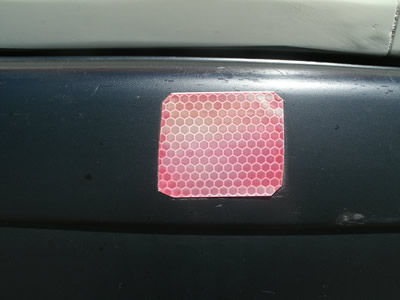Police Stories: What is proper procedure for spot fines anyway?
I’m beginning to think that my car is a magnet for attracting spot fine roadblocks. I was stopped again at a roadblock this morning. From previous experience I was semi prepared for another sit-in.
This morning’s police officer was nicer, but used the same threats. He asked for my driver’s license and then inspected my car. Finding a faded rear reflector (pictured above) the officer told me I would have to pay a $10 spot fine.
I told him I had no money and could not pay there and then, but was happy to be given a ticket to pay later.
The officer told me that they would take my car to the nearest VID, insisted that the spot fine had to be paid immediately, and told me to call someone. Another officer even came by and told me to call someone to bring the money for the fine.
I refused and told him again to give me a ticket. Finally, the officer took down my car’s license plate number and my name, and told me to replace my reflector.
Later, I spoke with Superintendent Andrew Phiri at Zimbabwe Republic Police General Headquarters who clarified what is supposed to happen when you are stopped at a roadblock and asked to pay a fine.
When you have been stopped by the police at a roadblock and you are found to be without a driver’s license, proper registration or any other fineable offense you have two options:
The first is to pay the spot fine the second is to be given a ticket.
If you pay the spot fine you are to be given a green form, which is your receipt. The green form is an admission of guilt form no: Z69J.
If you disagree or refuse to pay the fine, you may appear in court to contest. The police at the roadblock should give you a white form no: 265. The form will give you the court date on which you are to appear in court. The court date is set for between 7 and 14 days after the date of issue of the form. You may also pay the fine on or before this date.
If you do not have your driver’s license you should be issued a ‘production form’ and you have seven days to take your driver’s license to the nearest police station, where upon the ticket will be cancelled.
Police at roadblocks may use their discretion in issuing tickets and giving cautions.
If you are threatened with having your car impounded or taken to VID this is a scare tactic to make you pay the fine. The police are not legally enabled to do so.



Wednesday, October 12th 2011 at 11:33 am
Thanks for seeking clarity on behalf of all of us motorists. I think the key is to not be uneccesarily intimidated by those hungry guys. The most they will do is try to delay you, and sometimes, we cave in because the meeting we are rushing to costs more than the $10 they are demanding. They especially think we women drivers are pussies. One unlucky bastard kept me waiting on the roadsie, half an hour. I had all day to launch my silent protest coz, it was my day off. Thanks for all you are doing to inform motorists of what their rights are. I must also commend Augustine Moyo of the Herald for also seeking clarity on late amber etc.
Wednesday, October 26th 2011 at 8:55 am
Good advice-I have used similar tactics in the past, and not paid anything.
Wednesday, October 26th 2011 at 7:16 pm
I have a cracked windscreen which runs along the bottom and crosses diagonally in a fine line across the passenger side.
I was stopped many times. In Hatfield two women police officers told me I had to pay a fine. I said that I would pay a fine but would then go direct to the Police station to see the legislation and so they let me off with a “warning”.
Eventually when I was stopped at Mvuma for the same offence I asked to see the legislation and was amazed to have the document shown to me.
It states clearly, in words to this effect, that the window has to be cracked so that it is ” Opaque and obscures the view of the driver”. After this, on my journey I would simply quote the 2 operative words, ask if the policeman would like to sit in the drivers seat and see for himself, and that I was prepared to go to court.
I got a laugh, and “you can go “.
Wednesday, November 9th 2011 at 5:52 pm
There is need for wider awareness to drivers all around Zimbabwe about what happens when stopped at a roadblock, especially as to how far the police can go! On face value, it seems the police are the ones who need such awareness the most! Thank you to all who keep the public aware!